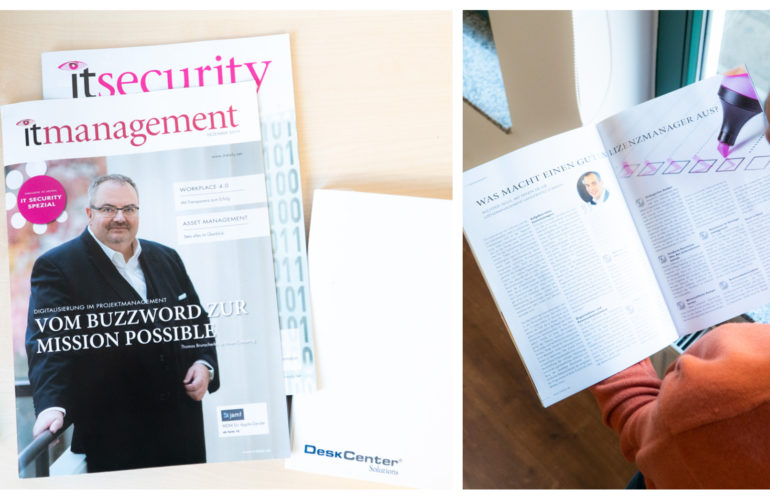In many IT departments, the licensing of software and the documentation involved aren’t part of the normal order of business. Indeed, numerous companies fall at the first hurdle of nominating someone to be responsible for license management. However, a license manager is indispensable if you want to avoid the high costs associated with relicensing or overlicensing as well as the potential legal ramifications. But what exactly are the duties of a license manager and what are the personal qualities that make a great one? There appears to be very little consensus across job specifications in terms of the qualifications required for the job because there is no specific training path for this position. This makes it all the more important to give some thought to drawing up a job profile to ensure that your company’s technology, including software licenses, is managed securely and efficiently at all times.
The job profile of a license manager is relatively new to the world of work. In many small and medium-sized enterprises, it is still very often the case that the IT administrator is also responsible for license management. However, this frequently leads to this area being neglected, which may in turn have both financial and legal implications for the company. Accordingly, the first step for management is to nominate a dedicated license manager. The second step is to clearly define the role and to make the right tools available, such as an end-to-end software asset management (SAM) tool, so that the license manager doesn’t need to use an Excel spreadsheet to keep track of all release versions of the programs used.

The tasks of a license manager are more varied than it may appear at first glance
So, a license manager manages the licenses for the software that’s used in the company, right? Right, but in fact a license manager also does much more. To adequately cover all areas of responsibility, a license manager is not only required to manage and check software licenses, but also to optimize and plan them. This includes consulting and coordinating with employees from all departments in the company. Negotiating prices and contracts is also par for the course for the responsible person. In addition, the license manager is responsible for managing large amounts of data that can be used for software purchasing, consolidation and licensing. Other responsibilities of a license administrator include secure, central storage of license certificates and a clear definition of licensing rules.
A good license manager is a skilled organizer and communicator
Clearly defining the role of a license manager is half the battle. However, to ensure that the right candidates are chosen for the position, it is also useful to be aware of the qualifications and soft skills. Some clear criteria and strengths emerge when we look at the job profile outlined above. Accordingly, a good license manager requires:
- Software and IT expertise
A certain level of software and IT knowledge is imperative when working in license management. Of course, someone with a business background may be appointed as a license manager. However, a basic knowledge of software installations, software contracts, software inventory and IT structuring (including workplaces, servers, cloud technologies and mobile devices) is always essential.
- Organizational Skills
There’s more to being a license manager than keeping track of licenses and managing billing and access data. The position also involves researching software, compliance with licensing rules and communicating with management. This requires a certain degree of organizational expertise to ensure consistent control and quality across all tasks.

- Strategic thinking
Does the company really need one type of software or another? Which programs can be compensated for by others, how many licenses will need to be repurchased in the future and how many areas could be moved to the cloud to save costs? These questions, which serve only as examples of the many questions to be answered by a license manager, indicate just how much strategic planning this role requires. A license manager is expected to use overviews and knowledge-based systems to optimize and plan software use and usage rights and to boost business operations in the longer term.
- In-depth knowledge of company operations
Which software is used in which parts of the company? Which colleagues are unable to work without a specific program? A good license manager understands the company and is familiar with the routine tasks performed by each department. This is essential in order to purchase the right software and strategically safeguard company workflows.
- Business acumen
When purchasing or repurchasing licenses, it is important to find or negotiate the best price at the best conditions. Taking a quick and easy approach to purchasing software licenses could cost the company dearly in the end. A license instructor therefore requires business sense when weighing up the costs of software licenses, the effort involved in installation and the organization of storage devices and license keys and ensuring the best possible price-performance ratio.
- Knowledge of contract management
A good license manager feels at home with contract management as well as with IT management. Ultimately, it is the license manager’s responsibility to minimize licensing risk and high costs incurred by violations of license policies. Yet another aspect of the job is the secure storage of license certificates and storage devices at a central location, ideally not only in a fire-resistant filing cabinet, but also digitally in the cloud.
- Communication skills
A license manager will always have lots to talk about – be it coordinating with other departments, negotiating prices and contracts or consulting with management. This requires a delicate balancing act between the company’s strategic vision and the compartmentalized thinking within the individual departments. This challenge demands excellent communication skills to pave the way for seamless license planning and management to the benefit of all stakeholders.
Ideally, the license manager will work closely with the IT administrator. This enables coordination of software inventory, software sharing and license management, as well as seamless IT asset management. Therefore, a good license manager checks in regularly with colleagues from the IT department. In many cases, the license manager and IT administrator are one and the same person. However, this only works if processes and rules are automated using a software asset management solution. License metrics, license types and the current software inventory can then be checked at the touch of a button and used to determine the next investments to make and strategies to pursue.
Benedikt Gasch, CTO DeskCenter Solutions AG
